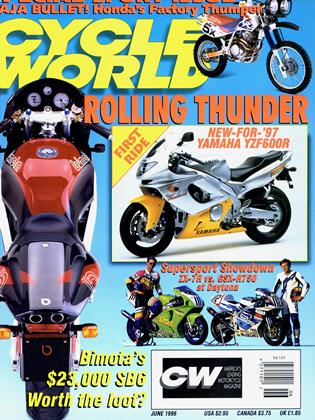ZELL/DUCATI DEAL FIZZLES
While Cagiva is busy touting its forthcoming new superbike, rumored financial troubles inside the Castiglioni Brothers’ empire may mean that a proposed deal to sell a majority interest in Ducati to an American investor is dead.
Under the terms of the proposed deal, Chicago financier Sam Zell was negotiating for purchase of up to three-quarters of Bologna-based Ducati. The result would be a new firm, to be called New Ducati, which would have replaced Ducati’s existing worldwide structure (see Roundup, March, 1996, and April, 1996).
Now, however, those close to Zell and the Castiglionis suggest that the deal has come apart. Contacts inside both parties’ companies are, however, reluctant to speak on the record. Said one Zell confidant, “We’re not making any comments about the rumors, but I wouldn’t dispute them.”
A source inside Ducati responded to a Cycle World query by suggesting that rumors about the collapse of the deal were untrue. A faxed response read, in part, “We kindly ask you to wait a moment before dealing with this matter in your magazine.”
Sources inside the Italian motorcycle business community say the completed deal would have given Zell 70 to 80 percent of Ducati for an undisclosed purchase price. The problem, these sources suggest, is that Cagiva is deep in debt to the powerful and muchfeared Guardia Finanza, the Italian equivalent of the Internal Revenue Service.
If Cagiva does indeed owe money to the government agency, sources suggest that one possible reason is that an untoward percentage of Cagiva’s profits may have been applied not toward the company’s tax responsibilities, but to the debt service on loans taken in the late 1980s and early ’90s to finance expansion into Eastern Europe, and also the purchase of MV Agusta, Moto Morini and several hotels.
The Zell/Ducati deal is falling apart, sources suggest, because Zell’s purchase monies would have gone to pay part of this tax bill instead of toward upgrades that would make Ducati better able to compete on the world motorcycle market. Said one observer, “Zell backed out because the value wasn’t there.”
Jon F. Thompson













